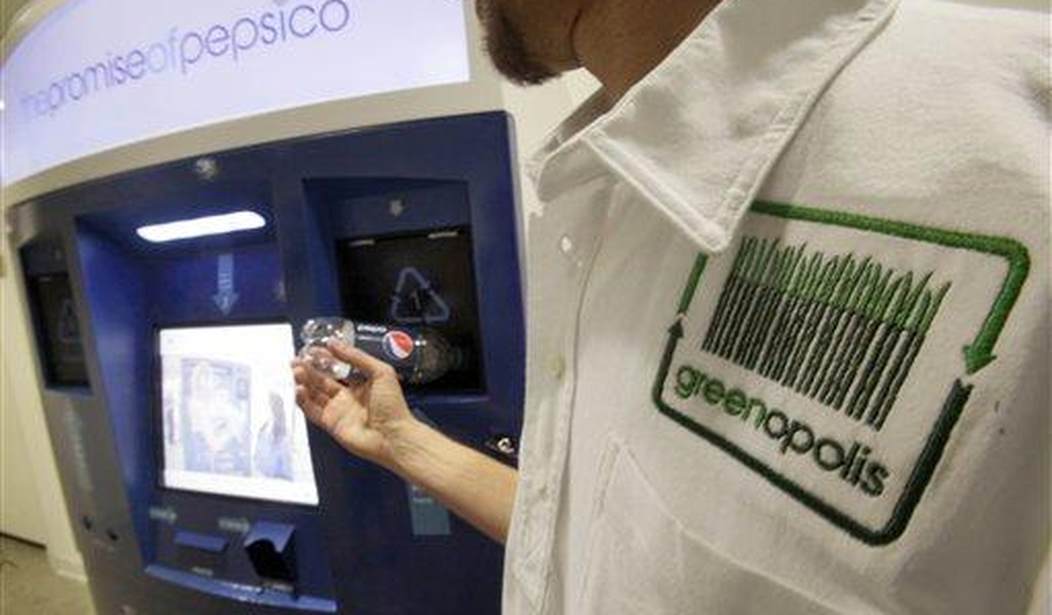Recycling is one of those things that everyone supports in theory, but too few people carry out in practice. While 95 percent of Americans believe that recycling helps the environment, fewer than half believe the current system actually works well. This is reflected by the data. According to a finding by the Container Recycling Institute, up to two-thirds of all beverage containers in the country never get recycled. This is both environmentally destructive and economically wasteful.
So, where’s the disconnect? Everyone understands the benefits of recycling, but apparently that’s not translating into tangible outcomes.
There are two primary reasons for why recycling has never really taken off at scale in America. The first is a basic lack of incentives. The cost and logistical complexity of sorting recyclable goods from regular trash have proved an economic burden on municipalities and local governments. Absent a strong consumer incentive to properly recycle materials, recycling programs have often ended up costing more money than they saved.
The second is that, because of this market failure, the U.S. has spent the last few decades simply shipping a lot of our recyclable materials overseas. In 2016 alone, we sent China 16 million tons of metals, paper, and plastic. But then the Chinese government decided it had enough, promptly embargoing the import of foreign waste goods in 2018, and causing a domino effect among other Asian nations. However, the damage had already been done: America’s long-term dependence on foreign countries to take our waste has precluded the development of a sturdy, domestic recycling infrastructure.
However, it needn’t be this way. The idea that recycling costs more money than it saves is an idea born out of bad – or absent – policy, not reality. Recycling doesn’t, inherently, have to be a trade-off between economics and sustainability.
Recommended
Consider, for example, the admirable track record of aluminum recycling. Nearly 75 percent of all the aluminum ever produced is still being used today, thanks to 90 percent or more recycling rates in industrial markets like construction and automotives. Recycling aluminum for industrial purposes uses 95 percent less energy than producing new aluminum, resulting in significant cost savings. It also cuts out the additional costs associated with importing high value materials from other countries with less secure supply chains.
A similar dynamic can exist for those two thirds of beverage containers that get wasted each year – a full 140 billion individual containers. Even aluminum containers aren’t safe, with fewer than 50 percent being recycled each year, a lost retail value of $800 million annually. Not only are we polluting the environment, but we’re also losing money while doing so.
In order to overcome the current challenges of recycling, though, creative solutions are required. One such solution is quickly gaining traction across the country again – 10 states already have it, but the most recent implementation was in Hawaii, 20 years ago. Recycling incentive programs, dubbed “bottle bills,” establish a refundable cash deposit on all beverage containers, whether they be glass, plastic, or aluminum. Consumers pay the deposit, typically only 5 or 10 cents, at the time of purchase and then collect their refund when they return the empty container. This is a powerful incentive to prevent recyclable bottles and cans just ending up in the trash, overcoming the aforementioned market failure.
Not only is this kind of program highly successful – containers that get sold with a refundable deposit on them ultimately get recycled at a rate of up to three times higher than those without such a deposit – but it also makes economic sense. It doesn’t cost the government any money, can reduce roadside litter by up to 70 percent, and creates a sustainable domestic supply chain of raw materials.
Simply put, deposit programs are a convenient and highly effective incentive for Americans to do their part for the environment without spending taxpayer dollars.
They also directly benefit municipalities, giving local communities an incentive to engage in better recycling practices. A comprehensive review of 33 studies on the matter, in regions across the world, found that in nearly every case, deposit return systems financially benefit municipalities, to the tune of millions of dollars per year. Moreover, they create thousands of local jobs.
In a world dominated by all-or-nothing political proposals, seemingly small solutions like establishing a refundable deposit on containers are not just elegant, but highly effective. They also clearly show that environmental responsibility doesn’t require economic sacrifice.
At the end of the day, this is a pro-economy, pro-environment, and pro-America solution. We shouldn’t have to rely on shipping our waste to other countries and letting them deal with it, nor should we abdicate our responsibility to be good stewards of our resources here at home. The American way is finding the most innovative solution possible. Reforming our recycling policy by establishing an incentive program like refundable deposits is rooted in common sense, serving both our economy and our environment.
Christopher Barnard is the Vice President of External Affairs at the American Conservation Coalition (ACC). Follow him on Twitter @ChrisBarnardDL.

























Join the conversation as a VIP Member